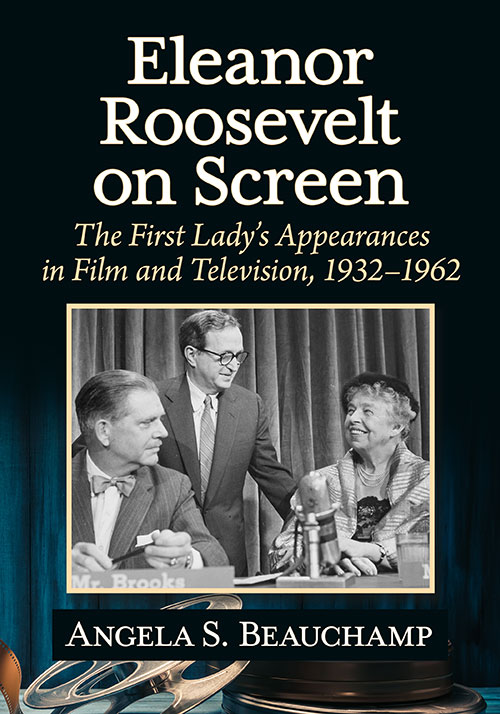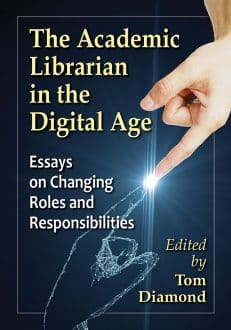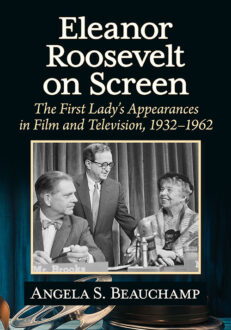Eleanor Roosevelt on Screen
The First Lady’s Appearances in Film and Television, 1932–1962
$75.00
In stock
About the Book
Eleanor Roosevelt recognized the power of film and television, especially as educational tools to reach young people. She hosted three political talk shows in the 1950s and early 1960s, often appearing in guest spots to promote the United Nations, Democratic candidates, and progressive issues with Ed Sullivan, Bob Hope, Frank Sinatra, Mike Wallace, and Edward R. Murrow. In the 1930s and ‘40s, fan magazines such as Photoplay and Modern Screen published her opinions on the movies, and she boldly appeared in an interventionist prologue to the 1940 anti–Nazi film Pastor Hall. During World War II, she contributed to civil defense films and became a staple joke in Hollywood comedies. She also negotiated postwar representations of FDR on the big screen, culminating in 1960’s Sunrise at Campobello, which portrayed her as the perfect wife.
This book is the first to address Eleanor Roosevelt’s moving image record and her relationship to film and television in the three decades from the 1932 presidential campaign to her death in 1962.
About the Author(s)
Bibliographic Details
Angela S. Beauchamp
Format: softcover (7 x 10)
Pages: 279
Bibliographic Info: 25 photos, appendix, filmography, bibliography, index
Copyright Date: 2024
pISBN: 978-1-4766-9302-6
eISBN: 978-1-4766-5107-1
Imprint: McFarland
Table of Contents
Acknowledgments v
Preface 1
Introduction 5
1. Manipulating Gender Expectations 11
Part I—In the Movies 17
2. Reluctance to Speak 18
3. Film Industry Censorship 21
4. Isolationism and Pastor Hall 25
5. “Eleanor Roosevelt is a bad security risk” 32
6. Movies and the White House 35
7. “First Lady in Movie Debut!” 46
8. Women in Defense 51
9. Postwar on Film 62
10. Negotiating FDR on the Big Screen 72
11. Movie Recommendations 86
Part II—On Television 89
12. Early TV Appearances 90
13. Today with Mrs. Roosevelt 95
14. Mrs. Roosevelt Meets the Public 109
15. “Grand Old Lady of the Democratic Party” 127
16. Joseph Kennedy’s Son 140
17. Anti-Communist Crusades 149
18. Khrushchev: “At least we didn’t shoot at each other!” 152
19. Bringing Issues of Race to TV 159
20. The UN: “Naïveté and cunning gracefully blended” 164
21. Reminiscing and Inspiring 176
22. Prospects of Mankind 199
23. Signing Off 216
Conclusion 224
Appendix: Film and Television Appearances and References During Eleanor Roosevelt’s Lifetime 227
Filmography 235
Television Episodes 239
Works Cited 241
Index 261
Book Reviews & Awards
• “Filled with entirely exciting and forever useful information, Angela Beauchamp’s splendid screen spin with Eleanor Roosevelt on TV and film will delight everyone! It is a joyful read filled with significant healing memories 1932-1962.”—Blanche Wiesen Cook, author of Eleanor Roosevelt, Volumes I, II, III
• “This book represents a much-needed addition to the existing Eleanor Roosevelt scholarship. Eleanor’s life had so many dimensions that her final years as one of the first women—if not the first woman—to do major public affairs broadcasting truly has been overlooked. Due to the painstaking research in this book, it is now possible for the first time to study Eleanor’s role in the media during the Cold War. This book allows us to appreciate how much she contributed to early television as she turned her attention mainly to international affairs. She speaks to us again as a voice of reason and peace in a turbulent world. The author deserves congratulations from all who study Eleanor Roosevelt, film, and television as well as the 1950s in general. This is a monumental labor of scholarly love.”—Maurine H. Beasley, author of Eleanor Roosevelt: Transformative First Lady and The Eleanor Roosevelt Encyclopedia
• “We all knew how Eleanor Roosevelt redefined the work of being First Lady so it was about time someone showed us how she redefined the way the media can be harnessed for good. Readers learn that Eleanor Roosevelt was both savvy and smart enough to smile when she was used as a punch line because any chance to remind the American people of her progressive causes was a chance worth taking. Beauchamp’s writing style is smooth and her respect for ER sincere making this a suitable book for educators and lay readers alike.”—Dr. Rosanne Welch, author of When Women Wrote Hollywood and American Women’s History on Film
• “It’s commonplace to say Eleanor Roosevelt was a First Lady of Firsts. Her accomplishments as a politician, diplomat, and precedent-setting first lady are well known. This study sheds valuable new light on her groundbreaking role in using television to advance the causes of world peace, tolerance, and the rights of women and the politically marginalized. Eleanor Roosevelt pioneered new ways to connect with everyday people and advance their interests. This work tells the little-known story of an innovative First Lady using the brand-new medium of television to make the world a better place. She was a veteran public speaker, newspaper columnist and radio star who embraced the new medium of television to change the world.”—Stephen Smith, editor of The First Lady of Radio: Eleanor Roosevelt’s Historic Broadcasts
• “Angela Beauchamp’s book is a terrific addition to the historical coverage of our most influential First Lady, Eleanor Roosevelt. A great communicator, Eleanor stepped up to every new opportunity to project her message. This book gives an in-depth and comprehensive look at the time she spent on radio and television, especially as that ‘new’ medium grew in reach and popularity.”—Robin Gerber, author of Leadership the Eleanor Roosevelt Way and Eleanor vs. Ike
• “In this groundbreaking book, Beauchamp examines Eleanor Roosevelt’s emergence as a media personality, adept at using film and television to educate and foster open, and sometimes difficult, public dialogue. The interplay of cultural politics, her persona, and her political acumen set the stage for relations between the visual media and first ladies who followed. This is a fascinating must-read.”—Patricia Bell-Scott, author of The Firebrand and the First Lady: Portrait of a Friendship: Pauli Murray, Eleanor Roosevelt, and the Struggle for Social Justice
• “Eleanor Roosevelt was famous for being the eyes and ears of her husband, who because of his polio-inflicted disability could not travel as widely as she could. Only a cooperative press enabled FDR to keep his paralysis a secret from the people. In her exhaustively researched book, Angela Beauchamp shows how his indefatigable first lady carried his New Deal and Four Freedoms messages to the people in every form of media, from her daily newspaper column to radio interviews to film appearances, and, after his death, to television. Due to the high-profile public life she maintained after leaving the White House, she was the able messenger of the ideals she and her husband shared as well as her own vision for a world in which social justice was respected and embraced. An impressive book about an impressive woman!”—Kathryn Smith, author of The Gatekeeper: Missy LeHand, FDR and the Untold Story of the Partnership that Defined a Presidency
• “Eleanor Roosevelt, First Lady, activist, diplomat, humanitarian, teacher and journalist understood the power of media like no other, especially as an educational tool about democracy. Scholars have written about her columns, speeches and radio broadcasts, but this is the first book to focus on the moving image. It details the many instances in which she was referenced, appeared herself or contributed in some other way to movies, documentaries, public information films and television programs. This book will appeal to all those interested in American political history, as well as film and television.”—Anya Luscombe, University College Roosevelt/Utrecht University
• “Angela Beauchamp (no relation) digs deeply into the complex and challenging ways the essentially introverted First Lady methodically and effectively became FDR’s eyes and ears. Using film and radio as no American leader had done before, Eleanor expanded and enhanced the President’s legacy during his lifetime and to this day.”—Cari Beauchamp, author of Without Lying Down: Frances Marion and the Powerful Women of Early Hollywood
• “This deeply researched and informative survey will send readers scurrying for clips of Eleanor Roosevelt to experience her masterful performances on screen firsthand.”—Susan Ware, feminist historian and biographer, author of Why They Marched: Untold Stories of the Women Who Fought for the Right to Vote
• “Richly sourced and urgently relevant, Angie Beauchamp’s superb split-screen restoration of Eleanor Roosevelt as a star-power Hollywood presence and surpassingly effective television broadcasting pioneer, reveals how the First Lady of newsreels, radio, and newspaper syndication took command of screens both big and small to shape our relationship to truth in democracy. A groundbreaking cornerstone to the new wing of 21st-century Roosevelt media studies.”—David Michaelis, author of Eleanor






